63rd Distinguished Faculty Lecture Series Challenges Traditional Masculinity, Urges Emotional Intelligence
06/06/2025
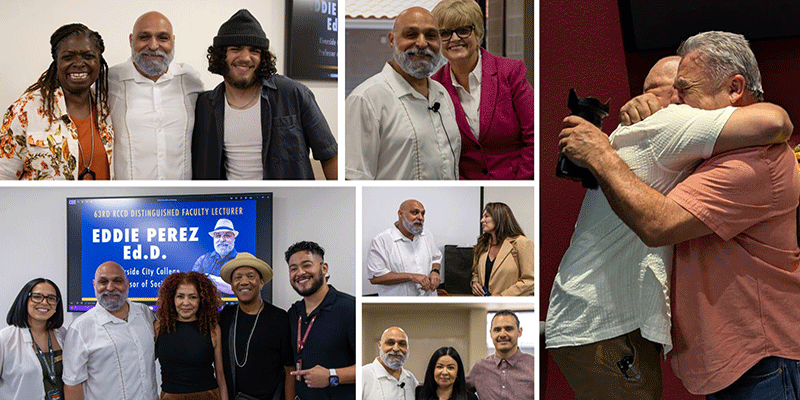
A packed audience filled the Hall of Fame at Riverside City College on May 29 as Eddie
Perez, Ed.D. delivered the final lecture of the Riverside Community College District’s
63rd Distinguished Faculty Lecture (DFL) series. The event capped off a three-part
lecture tour, spanning the district’s three colleges, with earlier presentations at
Moreno Valley College, where a special group of 40 high school male students from
Nuview Bridge Early College High School attended, and Norco College.
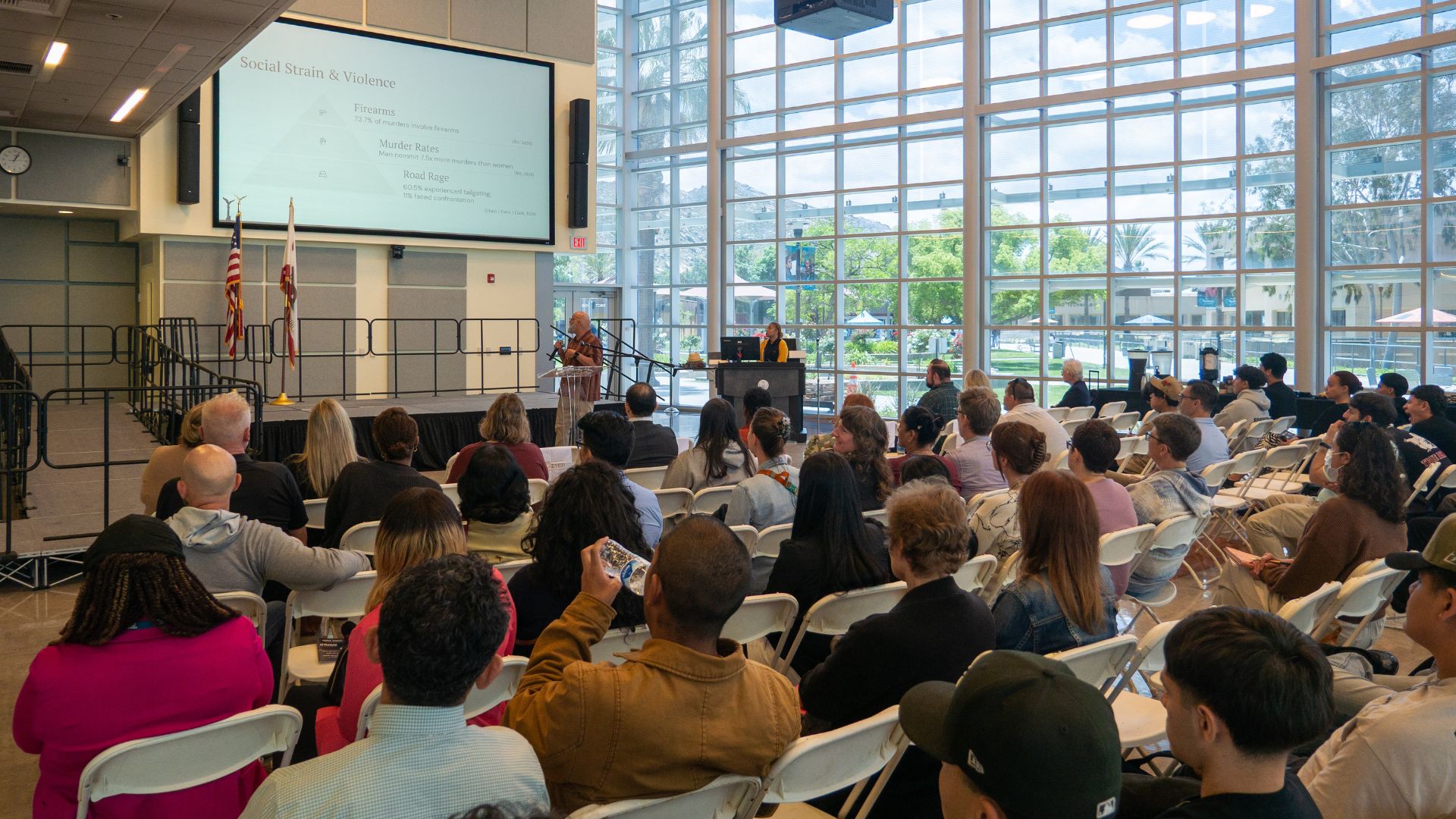
Eddie Perez presents at Moreno Valley College during the first stop on the Distinguished
Faculty Lecture.
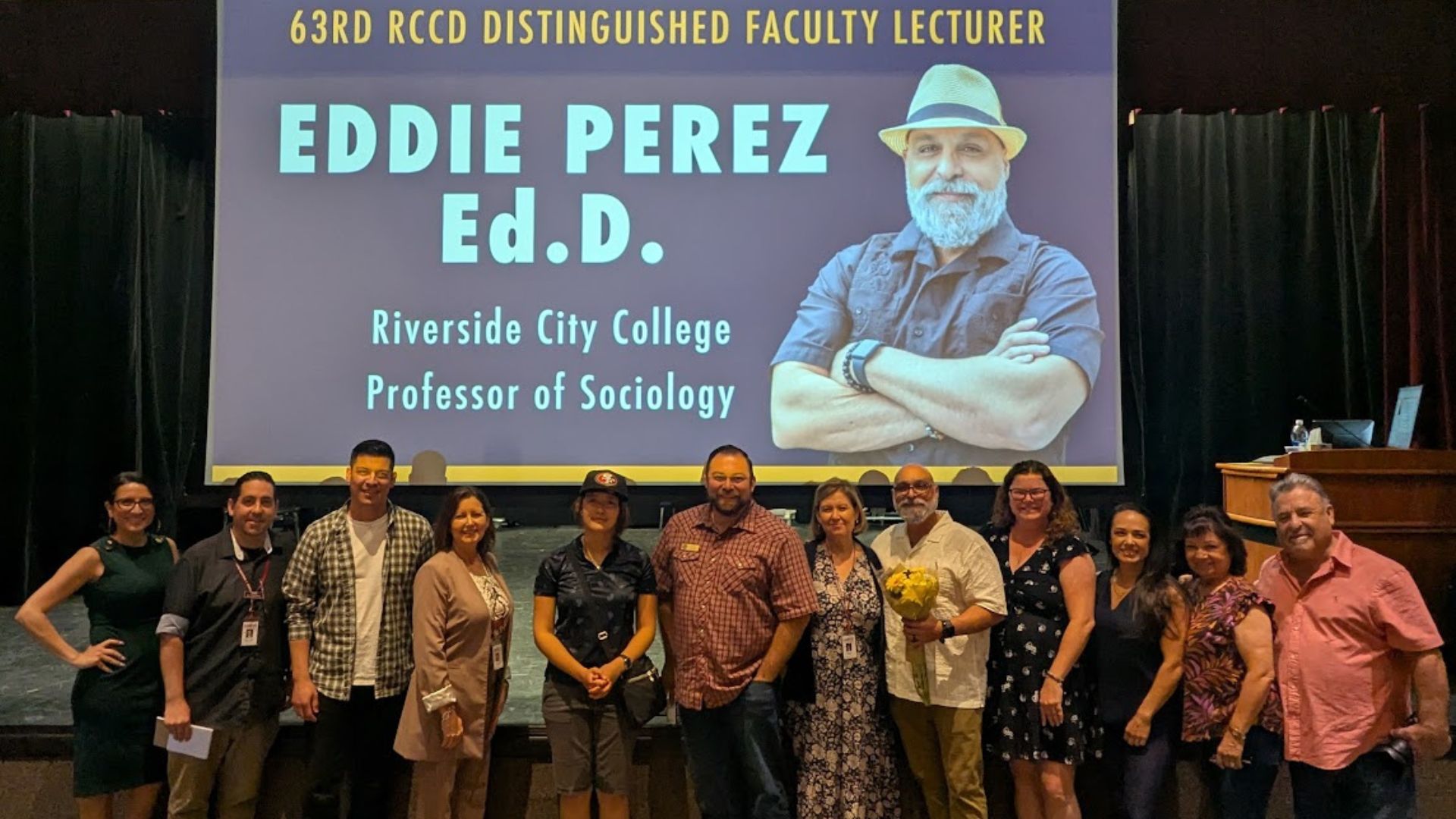
Eddie Perez joins Norco College President Monica Green and audience members following his presentation.
Perez, a professor of sociology at Riverside City College since 2006, was selected by his peers for one of the highest honors a faculty member can receive at RCCD. The initial DFL series was launched in 1961. This is an annual districtwide celebration of scholarly achievement, providing students, colleagues, and the community an opportunity to engage with groundbreaking research from RCCD’s top educators.
This year’s lecture, titled “From Strain to Strength: Rethinking Masculinity and Emotional Expression,” explored how rigid gender norms and outdated ideals of masculinity fuel urgent social issues: mental health crises, substance abuse, violence, and homelessness, particularly among men. As Perez explained:
“Historically, men have been expected to show only two emotions: ‘I’m fine’ or ‘I’m
angry.’ When people keep asking, ‘Are you sure you’re fine?’ it often just leads to
more frustration and anger. However, society’s expectations of masculinity push this
limited emotional script, and this has to change. Society needs to be more accepting
of men expressing a fuller range of emotions, and men need to learn to recognize and
express those emotions. This isn’t just about feelings; it’s about survival and redefining
what it means to be masculine. Men have to develop new skills: emotional skills, communication
skills, and even new job skills, because the world has changed, and we have to adapt.”
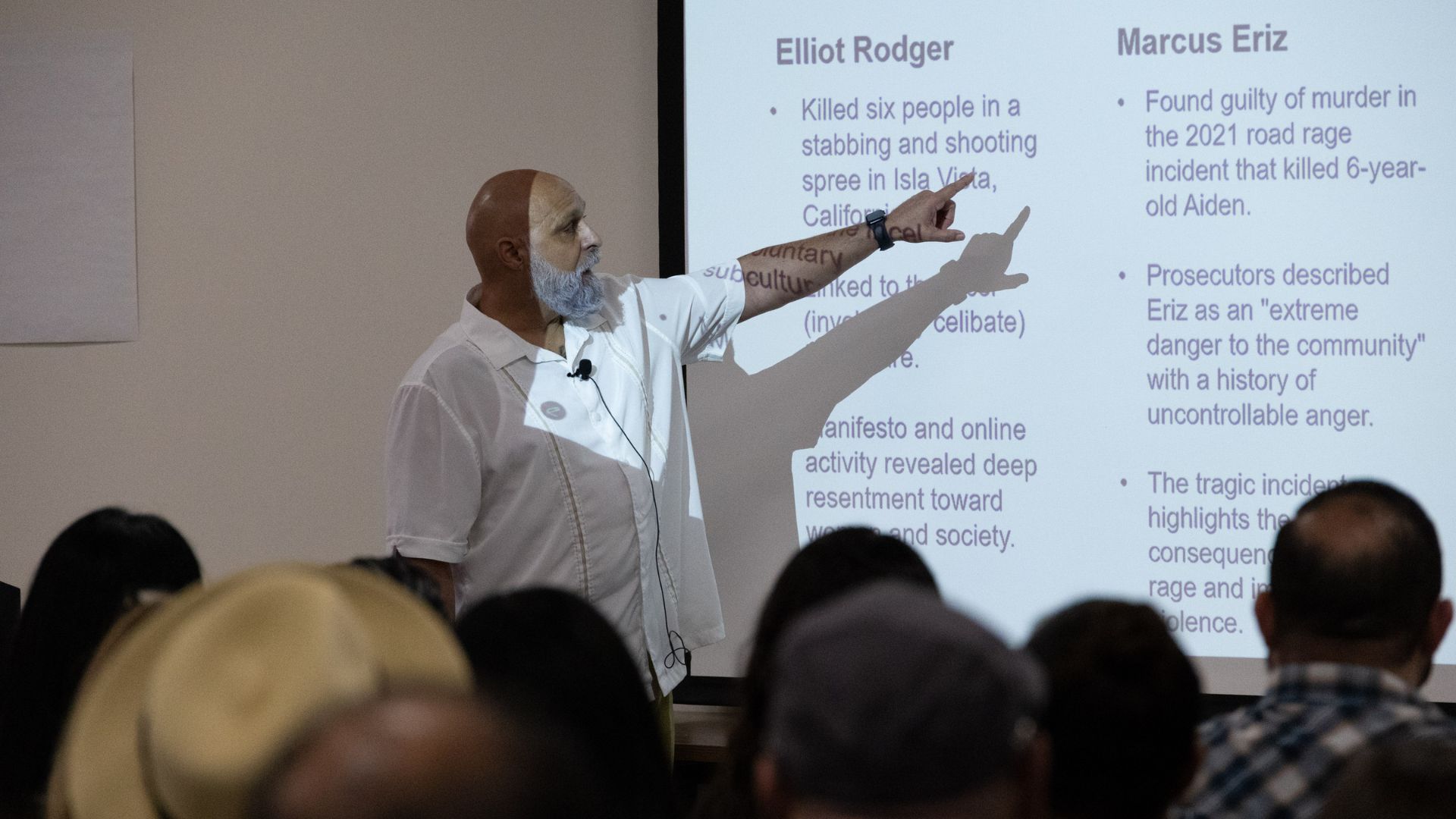
Eddie Perez speaks during the Distinguished Faculty Lecture at Riverside City College (RCC).
From Personal Story to Scholarly Inquiry
Perez began his presentation with a deeply personal reflection, recounting how his mother used to call him “Corajudo,” a Spanish term loosely meaning grumpy or short-tempered. That label followed him into adulthood and became the spark that fueled his academic interest in male emotional development.
His lecture skillfully wove personal insight with academic theory, drawing on sociological, criminological, and psychological frameworks to explain the emotional barriers men face. He highlighted Normative Male Alexithymia (the socialized difficulty men have identifying or expressing emotions) and its connection to depression, addiction, and violence.
Using Strain Theory, originally developed by Robert Merton, further explored by Robert Adnew, and later applied to gender roles by Joseph Pleck, Perez explained how societal pressures and economic changes challenge traditional male identities, especially when roles like ‘breadwinner’ become harder to fulfill.
“There’s this constant rhetoric about immigrants taking jobs,” Perez said. “But the truth is, many of the jobs men used to rely on—manufacturing, manual labor—have disappeared due to automation and globalization. We have to prepare for the future. That means men need to be in classrooms, learning the skills for today’s economy.”
Beyond the Data: A Call to Action
The lecture highlighted the shift in the labor market: manufacturing jobs have declined by 30% since 1980, while employment in fields such as health, education, administration, and literacy (HEAL) has increased by 158%. However, men represent less than 25% of this new workforce.
Perez believed that bridging the gap starts with emotional intelligence—teaching men to recognize, express, and manage their emotions in healthy ways.
He urged attendees to:
-
-
- Connect: Build support networks and foster open conversations within their communities.
- Share: Break the silence by talking about emotional intelligence.
- Act: Incorporate these principles into daily life and relationships.
-
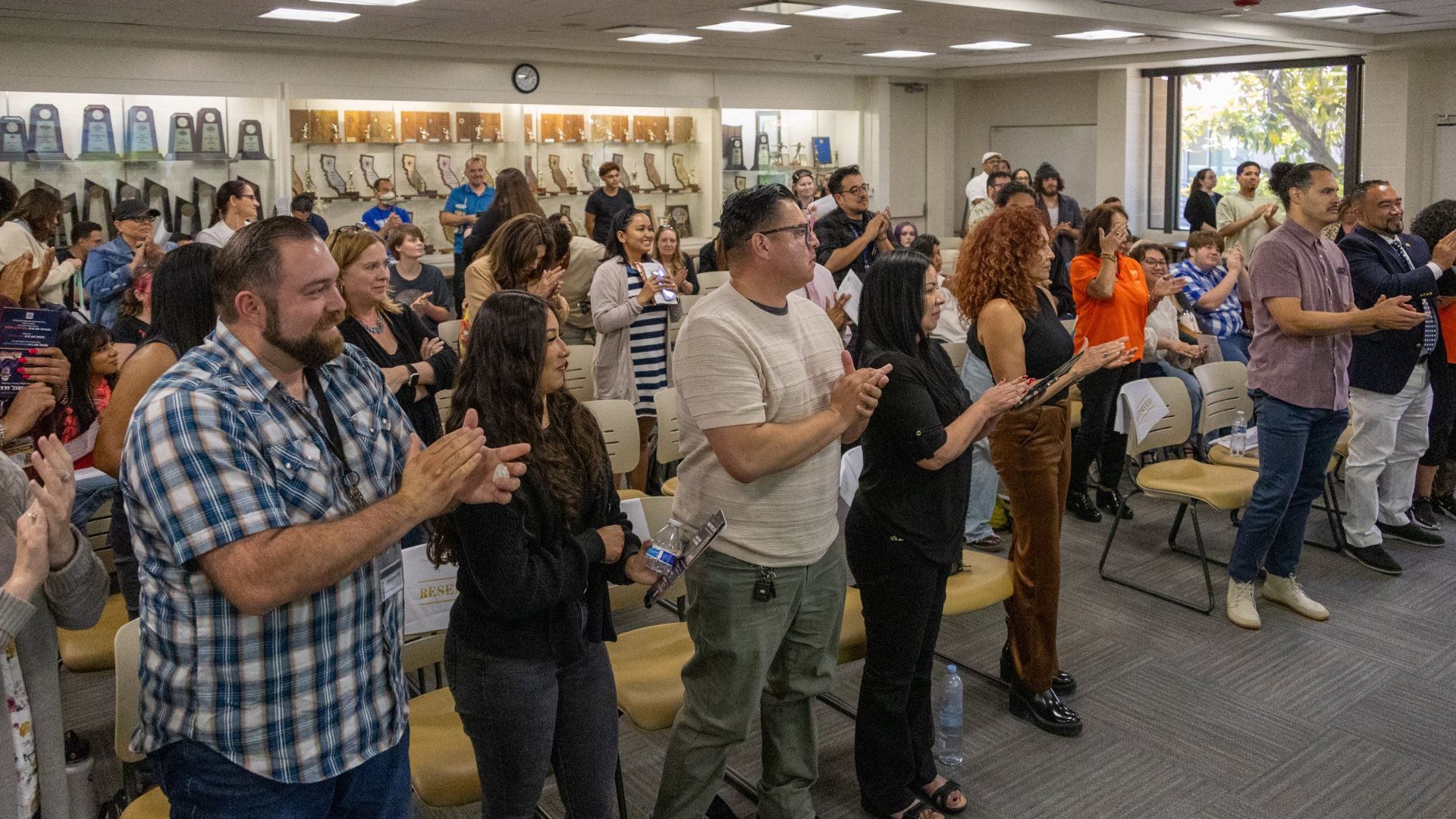
Eddie Perez receives a standing ovation at the conclusion of his lecture at RCC.
The impact of the series extended beyond the campuses. Students described Perez as a mentor and role model. Faculty praised the lecture for its timely relevance and emotional resonance.
As one audience member put it, “This wasn’t just a lecture—it was a mirror. And I saw things I needed to face that had not been dealt with.”
Eddie Perez’s contribution through the 63rd Distinguished Faculty Lecture has already sparked new conversations across the district and beyond. Through scholarship, storytelling, and sincerity, he reminded the RCCD community that rethinking masculinity isn’t about losing tradition—it’s about gaining wholeness.
A recording of the 63rd Distinguished Faculty Lecture is available to view here.
Published by External Relations & Strategic Communications

